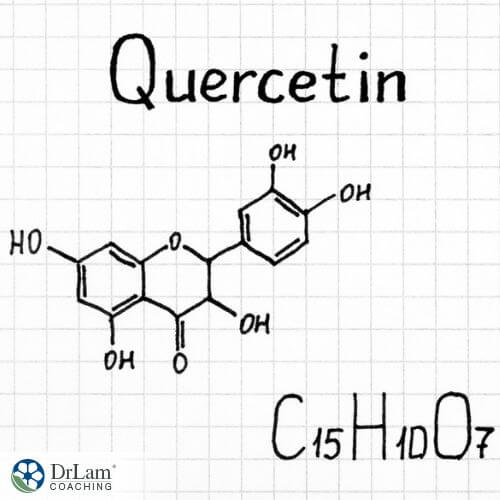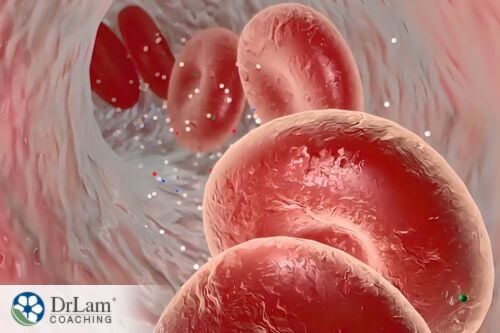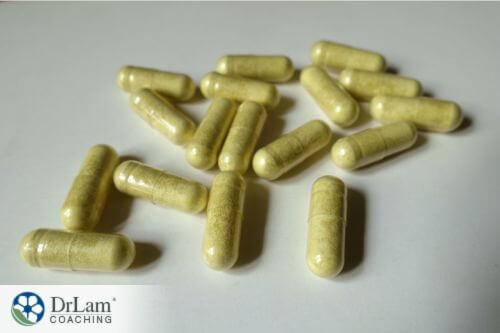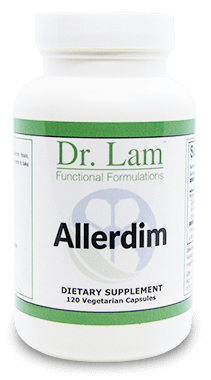 Quercetin is not a vitamin or mineral, but it has many benefits to your health and is abundant in many different types of foods. Quercetin is part of the flavonoid group and is a plant pigment. It contributes to the plant's color. Its color is yellow, and in food sources where quercetin is abundant, this yellow color may be noticeable. It is available naturally through dietary sources as well as in supplemental form. Studies show it may have several health benefits.
Quercetin is not a vitamin or mineral, but it has many benefits to your health and is abundant in many different types of foods. Quercetin is part of the flavonoid group and is a plant pigment. It contributes to the plant's color. Its color is yellow, and in food sources where quercetin is abundant, this yellow color may be noticeable. It is available naturally through dietary sources as well as in supplemental form. Studies show it may have several health benefits.
Due to bodily processes, stress, illness, and even environmental pollutants, your body produces unstable molecules called free radicals. These molecules can cause damage to your body, increase inflammation and contribute to chronic illness and conditions such as cancer. Antioxidants come into play by neutralizing free radicals and preventing further and future damage to your body. Quercetin is a potent antioxidant, and studies suggest that it can reduce inflammation and premature aging as well as reduce the risk of chronic illness.
Not only can it stop premature aging, but quercetin can also help to protect your body against bacteria. Studies have found that quercetin helps to protect from salmonella, staph, and E.coli. This is done by destroying the cell walls of these bacteria and changing cell function. It interferes with the growth of bacteria that is resistant to medications and may assist in recovery from these bacteria. It is also effective at protecting against bacterial infections in the respiratory, gut, and urinary systems.
Mild inflammation that occurs for a short time can be beneficial and assist with recovery. However, long-term, severe inflammation is not beneficial. It is known to cause pain, lengthen recovery time, and can cause chronic illness as well as complications.
Quercetin may come in handy here with test tube studies showing that it can potentially help to improve inflammatory markers in the blood, reducing inflammation in the body. Studies researching the effect of quercetin in autoimmune conditions that are associated with inflammation also found that supplementation of quercetin helped to improve pain and stiffness.
Quercetin can help to improve heart health in various ways. It reduces blood pressure, the pressure the blood exerts on arteries. This helps to prevent any future damage that would have been caused by high blood pressure. It also helps to regenerate blood vessels, improving blood flow and thus improving heart function.
In terms of the different types of fats in your blood, quercetin assists in reducing total cholesterol and triglycerides. This helps to prevent these levels from rising and causing plaque in the arteries, preventing the risk of heart attacks and strokes. One type of cholesterol is LDL cholesterol, which is considered 'bad cholesterol' and can contribute to heart disease. Due to oxidation, LDL cholesterol can harden in your arteries causing plaque. Studies suggest that quercetin can help to reduce this hardening of LDL cholesterol.
With quercetin's antioxidant properties and its ability to reduce inflammation, it has been the subject of many studies on its effect on brain health. The flavonoids as a whole have been studied for their use in preventing Alzheimer's; however, there have now been studies researching the effect of quercetin. One study found that a daily dose of quercetin through onion powder over six months improved cognitive function, reduced depression, and increased overall motivation. But though it may be a compound that could potentially delay cognitive decline, more research is necessary.
 When you consume food, the food is broken down into glucose. For your cells to use this glucose, a hormone, insulin needs to be released. In healthy individuals, the body is sensitive to insulin; however, in conditions such as diabetes and polycystic ovary syndrome (PCOS), the body can become resistant to insulin resulting in high sugar levels. This can lead to weight gain, kidney conditions, poor eyesight, and poor wound healing. This makes glucose control important for overall health.
When you consume food, the food is broken down into glucose. For your cells to use this glucose, a hormone, insulin needs to be released. In healthy individuals, the body is sensitive to insulin; however, in conditions such as diabetes and polycystic ovary syndrome (PCOS), the body can become resistant to insulin resulting in high sugar levels. This can lead to weight gain, kidney conditions, poor eyesight, and poor wound healing. This makes glucose control important for overall health.
Research suggests that quercetin may assist in increasing the sensitivity of the body to insulin and stimulating your cells to take in glucose, leading to better glucose control. Whilst this research is showing potential for quercetin in glucose control, more research is necessary.
Due to its antioxidant properties, researchers believe that this compound may help fight cancer. Test tube studies suggest that quercetin suppresses the growth of cancer cells and can cause cancer cells to die. This was found in prostate, liver, lung, and colon cancer to name a few. But while this is promising, more research especially using humans is necessary.
Quercetin found naturally in foods is safe with no side effects. Quercetin supplements are considered safe to use for most people. However, there may be some side effects that include:
These side effects were more common in individuals taking a supplement that contained more than 1000mg of quercetin.
This supplement is not advised for pregnant or breastfeeding women and if you are currently taking chronic medication, it is important to get clearance from your healthcare provider before using this supplement as quercetin can interact with the medication.
There is a range of foods that contain this flavonoid. Some food sources that contain the highest amount of quercetin, include:
However, there are many other foods containing quercetin but in lower quantities such as:
Note that you can also boost the absorption of quercetin by taking it with vitamin C and fats.
Quercetin can also be found in a supplemental form, in either pill or capsule form. The average dose of quercetin in supplement form is 500-1000mg. It is often found as either the sole ingredient in a supplement or part of an anti-inflammatory blend. Dr. Lam has formulated Allerdim, a supplement that contains Quercetin, Bromelain, and Stinging nettle in order to combine the best nutrients to combat histamine. Be aware that you have to take high enough doses of this supplement in order for the herbs to work well. Ask an experienced provider before starting supplements.
Whilst your body can manage stress, it is designed to handle short-term stress and not long-term stress. Your adrenal glands as well as the NeuroEndoMetabolic (NEM) stress response system work together to handle stress. Your adrenal glands respond to stress by releasing stress hormones such as cortisol.
In long-term stress, the adrenal glands can become depleted and this can cause imbalances within the NEM system to occur. Adrenal Fatigue Syndrome (AFS) is a condition that individuals experience in times of long-term stress. The symptoms of AFS will depend on where in the NEM system the imbalance is occurring. One of the circuits in the NEM system is the Inflammation circuit. It consists of the immune system, gastrointestinal tract, and gut microbiome and works to regulate inflammation in the body.
An imbalance within this circuit can cause inflammation to increase in the body. This can cause many different symptoms such as aches and pains, frequent illness, symptoms of irritable bowel syndrome (IBS), and food sensitivities.
Many different remedies can help to provide relief from these symptoms. Quercetin is one of these remedies that can assist with reducing inflammation in your body as well as helping to prevent further damage to your body from inflammation.
 Whilst quercetin can be an effective remedy to help provide relief from inflammation, there are some cautions to be aware of when you are experiencing AFS. In AFS your body can become more sensitive than usual to any new products or supplements. This can cause your body to react to the food or product and set you back on your healing journey. On top of this, if there is an imbalance in your inflammation circuit, it can cause you to react to foods. This could cause you to react to quercetin-rich foods if you are trying them for the first time.
Whilst quercetin can be an effective remedy to help provide relief from inflammation, there are some cautions to be aware of when you are experiencing AFS. In AFS your body can become more sensitive than usual to any new products or supplements. This can cause your body to react to the food or product and set you back on your healing journey. On top of this, if there is an imbalance in your inflammation circuit, it can cause you to react to foods. This could cause you to react to quercetin-rich foods if you are trying them for the first time.
To reduce the risks of this occurring, it's important to seek support from your healthcare provider if you would like to increase quercetin in your diet or use it as a supplement. Your healthcare provider will be able to guide you on how to increase quercetin in your diet or through supplements in a way that will support your body.
Quercetin is a plant compound that is showing promising results for many different aspects of health including heart health, gut health, and reducing inflammation. There are many different dietary sources of quercetin with the dietary source containing the highest amounts of quercetin being:
Quercetin is also available in supplemental form. However, if you are experiencing AFS, are pregnant or breastfeeding, or are on chronic medication, check with your healthcare provider before taking it.
If you feel that the symptoms of an imbalance in the inflammation circuit resonate with you, the Dr. Lam team can be of assistance. You can call us at +1 (626) 571-1234 or click here for a free initial call.

Dim your histamine response with Allerdim
Vitamin C and fat are two nutrients that can increase the absorption of quercetin. You can do this by including food sources of quercetin in meals with fat and citrus or cruciferous veggies. This way the fat from the meal and vitamin C from the vegetables or fruit will help to increase the absorption of quercetin.